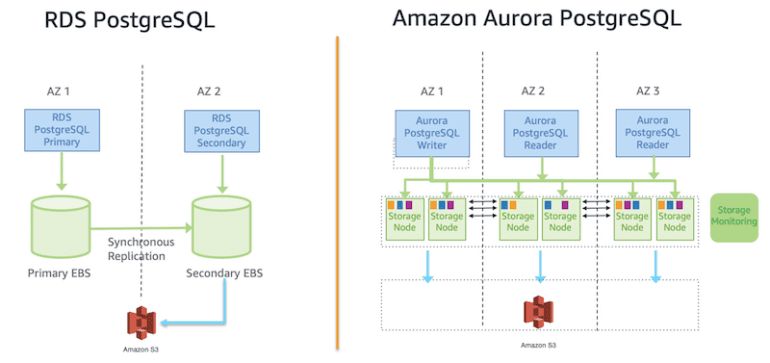TL;DR:
- AWS announces support for pgvector in Amazon Aurora PostgreSQL, enabling vector storage and similarity search for machine learning embeddings.
- The pgvector extension simplifies the storage and retrieval of embeddings, benefiting natural language processing, chatbots, and sentiment analysis.
- It allows identifying exact and approximate nearest neighbors, seamlessly integrating with other PostgreSQL features.
- Applications like LangChain and Streamlit can leverage pgvector to build interactive, natural language-based search systems.
- ML capabilities can be integrated into e-commerce, media, and health applications using Aurora PostgreSQL.
- Industry experts praise the speed and precision of similarity search using pgvector on reasonably sized datasets.
- Similarity searches benefit e-commerce, recommendation systems, and fraud detection in various industries.
- Competing managed database services also adopt pgvector to keep up with generative AI trends.
- The extension is available on Aurora PostgreSQL 15.3 and higher in all AWS regions.
Main AI News:
In a move that further solidifies its position as a leader in cloud-based managed databases, AWS has made an exciting announcement regarding Amazon Aurora PostgreSQL. The platform now fully supports pgvector, a cutting-edge extension designed to facilitate vector storage and similarity search. This development marks a significant step forward for businesses harnessing the potential of generative AI and machine learning models.
The incorporation of pgvector into Aurora PostgreSQL streamlines the storage and retrieval of embeddings in existing Postgres databases, allowing users to capture the rich semantic meaning of text inputs. Shayon Sanyal, principal database specialist solutions architect at AWS, underscores the versatility of pgvector for various applications, including natural language processing, chatbots, and sentiment analysis.
One of the most compelling aspects of pgvector is its ability to identify both exact and approximate nearest neighbors. This ensures seamless integration with other PostgreSQL features, such as indexing and querying, enabling users to leverage the full potential of the platform. The need for storing vector embeddings generated by tools like ChatGPT and other LLM technologies is addressed by pgvector, as it provides a robust and permanent storage solution.
In a captivating demonstration of pgvector’s capabilities, Sanyal showcases the creation of an interactive application using LangChain and Streamlit. This user-friendly application empowers individuals to ask questions in natural language, with the system retrieving relevant information from PDF files based on the queries.
Beyond simplifying storage and search operations, the pgvector extension opens up new avenues for ML integration in industries such as e-commerce, media, and health applications. By enabling ML-based predictions using SQL language, Amazon Aurora facilitates the seamless integration of ML capabilities into various business workflows.
The excitement surrounding pgvector is further amplified by endorsements from industry experts. Stefan Borsje, co-founder at Glass, expresses astonishment at the remarkable speed and precision of similarity search on a reasonably sized dataset. Borsje’s reaction begs the question: What kind of magic powers this level of performance?
Krishna Sarabu, the senior database specialist solutions architect at AWS, delves into the practical applications of pgvector by illustrating how to build AI-powered search in PostgreSQL using SageMaker. Through similarity searches over embeddings, industries can unlock the potential for enhanced e-commerce experiences, personalized recommendations, and robust fraud detection systems.
The widespread adoption of generative AI has spurred competition among managed database services. To keep pace, various providers have extended support for pgvector. Alongside AWS, services like Azure Database for PostgreSQL Flexible Server, Azure Cosmos DB for PostgreSQL, Amazon RDS for PostgreSQL, Google Cloud SQL for PostgreSQL, and AlloyDB for PostgreSQL have embraced the power of this extension.
For those eager to take advantage of the possibilities unlocked by pgvector, the extension is now available on Aurora PostgreSQL 15.3, 14.8, 13.11, 12.15, and higher in all AWS regions. AWS has also provided comprehensive documentation covering all supported extensions, their versions, and instructions on working with PostgreSQL extensions and foreign data wrappers.
Conclusion:
The integration of pgvector into Amazon Aurora PostgreSQL marks a significant advancement in AI capabilities. This support enhances the storage and retrieval of embeddings, empowering businesses to unlock the potential of generative AI and machine learning models. As more industries adopt similar technologies, the market can expect a surge in data-driven insights, enhanced user experiences, and personalized services, giving companies a competitive edge in their respective domains. Embracing pgvector represents a strategic move for businesses aiming to stay ahead in the fast-evolving landscape of AI-driven innovation.

